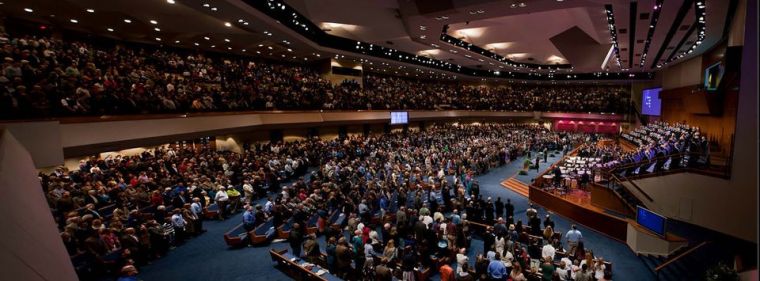Is Southern Baptist Decline Primarily an Image Problem?

In 2016 the Southern Baptist Convention reported that the denomination's membership had declined for the ninth consecutive year, losing 200,000 members in 2015. Baptisms of new believers also declined by 10,000.
The analysis of many Southern Baptist leaders was understandably straightforward. If the SBC is declining and baptisms are down, then it is struggling to evangelise effectively and in sufficiently large numbers.
Frank S. Page of the Executive Committee remarked: "The truth is, we have less people in our churches who are giving less money because we are winning less people to Christ, and we are not training them in the spiritual disciplines of our Lord."
Thom Rainer, President and CEO of the SBC's LifeWay Christian Resources echoed this evaluation: "People underestimate the importance of momentum," he said. "It only takes a few people in each church, being intentional about sharing their faith, for some new momentum to build."
While I am not a Southern Baptist and have no plans to attend an SBC congregation, I am sympathetic to the decline of any Christian denomination. I am also friends with many former Southern Baptists who have strong opinions about why this denomination has declined in recent years. However, the most insightful source of information about ways to turn around the SBC may be Thom Rainer's blog.
In a recent post, Rainer wrote that he had conducted an informal poll with his large following of 235,000 on Twitter, asking for their reactions to the word "Baptist."
While Rainer is well respected across denominations beyond his own, it's reasonable to expect that his followers are still immersed in the SBC or familiar with it. I personally found it surprising that even among Rainer's followers, his list ended up having so many negative words or words that implied irrelevance:
- Legalism
- Potluck
- Immersion
- John the Baptist
- Traditional
- Bible
- Outdated
- Southern
- Boring
- Conservative
- Sound theologically
- Fundamentalism
- Hymns
- Suits and ties
- Missions
While Rainer abstained from offering his own commentary, I found that it matched the anecdotal stories I have heard from my friends who are former Southern Baptists or my friends who attend SBC churches with some reservations. As I considered the many articles I've read in the past year about the decline of the SBC and the resolve of many to evangelise more, a list like this is striking.
Put plainly, are Southern Baptists trying to convince people to join churches that they have no intention of ever joining just based on what they think about "Baptists"? I'm not talking about rebranding or changing names here. I'm talking about a deeper issue about what people associate with Christians, and most specifically with Baptists.
If people already have an overwhelmingly negative image of Southern Baptists, then perhaps a list like Rainer's could help them consider what needs to change before committing themselves to more fervent evangelism efforts. To a certain degree, Southern Baptists are already working to change their image by planting new churches that leave behind the "boring", "suit and tie" and "outdated" labels.
In 2014, the SBC planted 985 new churches, which was a 5 per cent increase. It's often significantly easier to launch new churches than to change an existing church. The SBC should be credited with taking those steps.
But the larger problems with the SBC remain, specifically with legalism and fundamentalism. While certain Southern Baptist beliefs, such as the limitations on women in ministry, will frequently serve as a barrier to converts, the SBC is in greatest need of being known as people who show love and mercy.
That is a tall order for a group that has also forged its identity around keeping clear doctrinal boundaries and excommunicating those who cross those lines.
Perhaps the most accessible way forward for the SBC is to consider a year of biblical reflection on the opposites of legalism and fundamentalism. If legalism is an excessive reliance on laws and rules, a study of God's love and mercy or the Bible's teachings about transformation could prove especially relevant.
Most importantly, if Jesus said that love should be the hallmark by which his followers are known and Paul prayed that his followers would know the immeasurable vastness of God's love, it would appear extremely worthwhile to devote a significant amount of time exploring the nature of God's love and acceptance of us.
Southern Baptists are surely familiar with the phrase: "You become what you worship." It is something I heard frequently in my childhood Baptist church. It's possible that people known as legalistic and fundamentalist have been worshipping a God who is also legalistic rather than merciful. Perhaps that isn't the case for all SBC members, but isn't it worth setting aside some time to determine where the fruit of legalism is coming from and seeking God's direction in order to forge a new identity?
I count 157 occurrences of the word mercy in the English Standard Version of the Bible, an SBC favorite. The word merciful occurs 27 times. For people hoping to leave their legalistic image behind, the Bible is more than capable of leading them toward transformation. Perhaps if words like love and merciful top such lists in the future, a renewed emphasis on evangelism will hardly be necessary.
Ed Cyzewski (MDiv) is the author of Pray, Write, Grow, A Christian Survival Guide, and The Contemplative Writer. He writes at www.edcyzewski.com and is on Twitter as @edcyzewski.











